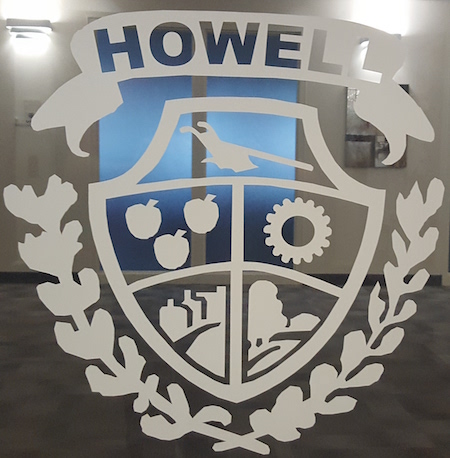HOWELL – Members of the Howell Township Council have tabled a resolution which states their opposition to legislation that was recently signed into law by Gov. Phil Murphy.
On March 18, Murphy signed S-1073, the “Clean Stormwater and Flood Reduction Act,” into law. Opponents of the law have dubbed the legislation a “rain tax.”
The law permits, but does not require, a municipality (among others) to establish a storm water utility for the purposes of acquiring, constructing, improving, maintaining and operating a storm water management system.
According to the resolution which appeared on the council’s April 2 agenda, under the law, a municipality that establishes a storm water utility is authorized to charge and collect “reasonable fees and other charges to recover the storm water utility’s costs for storm water management.”
The fees and other charges are to be collected from the owner or occupant of any property from which storm water runoff originates and which enters the storm water management system or the waters of the state.
A municipality that collects fees or other charges is required to remit to the state treasurer annually an amount equal to 5 percent of all fees or other charges, or $50,000, whichever is less, to be deposited into the “Clean Stormwater and Flood Reduction Fund” which was established by the legislation, according to the resolution.
Following a discussion, council members voted 4-1 to table the resolution opposing the state law and to permit the members of the Howell Environmental Commission and the Planning Board to review the document.
The resolution states that “the citizens of Howell are already under a burden due to the various taxes and fees imposed by federal, state and local governments, and although the Township Council supports environmental causes and concerns, it does not wish to add to the burden of its citizen taxpayers by establishing a storm water utility and charging the permitted fees.”
During public comment, Joan Osborne, who chairs the Environmental Commission, said residents who may be interested in the council’s action did not have sufficient notice the resolution would be on the agenda.
She said that last summer, residents in Howell’s Ramtown section “went through horrible flood damage caused by storm water.”
The law “is just a tool that is now available to the township should they want to create a source of funding to take care of storm water so floods like we experienced in Ramtown do not happen on a worsening basis every year,” Osborne said.
She said the law “is not a tax on rain, it is a tax on storm water runoff.”
“Anything that does not get into the ground because of how you developed your property becomes the problem of the whole community, and we are all already paying for it through our property taxes. It is not a double tax, it is just a way to make the people who are actually creating the problem have more responsibility for the problem instead of spreading it out through the whole community,” Osborne said.
Osborne said she was concerned the resolution appeared on the council agenda without being discussed with the Environmental Commission, specifically about the possibility of enforcing the law only on commercial developments.
Councilman Thomas Russo asked if Howell has a storm water plan in place.
Township Attorney Joseph Clark said the township does not have a storm water utility, but does have storm water ordinances. He said the definition of storm water in the new state law is identical to Howell’s definition.
Director of Community Development Jim Herrman said Howell’s ordinances mirror the state guidelines.
“For a storm water utility, the information that is out there is lacking. (The state law) is basically authorizing the formation of the utility, but there is no guidance on how to actually do it, what to charge, who to charge and why to charge them,” Herrman said.
Herrman said money raised through storm water fees could only be used to address storm water issues. He said the New Jersey Department of Environmental Protection has 18 months to come up with guidance to provide to municipalities.
Russo said the way he reads the new law, it appears to mean double taxation for the same service. He said while he supports improvements where necessary, “I do not want to have taxpayers pay for the same thing twice. … it is a burden on our taxpayers. We are already paying a ton of money on our taxes.”
Herrman said a storm water utility would increase taxes on residents and businesses, but reiterated there has been no guidance provided from the state.
Mayor Theresa Berger asked when the state would provide guidance on the issue and Clark said guidance may be provided in the fall of 2020.
Councilman John Bonevich said he believes the new law is intended to place the burden on large corporations and commercial properties. He said he would like to have the law as a tool available with large projects coming up in Howell.
The discussion continued until Deputy Mayor Evelyn O’Donnell made a motion to table the resolution until the Environmental Commission and the Planning Board can review it. Bonevich seconded the motion.
On a roll call vote, Councilwoman Pamela Richmond, Bonevich, O’Donnell and Berger voted “yes” on the motion to table the resolution. Russo voted “no.” The resolution was tabled in a 4-1 vote.

